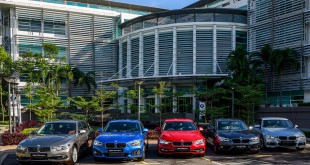After revealed Malaysia Budget 2010 on last Friday. Yesterday, MITI revealed it’s revised of National Automotive Policy (NAP). The revision of NAP has addressed most of its business opportunity, bumiputera privilege, protection, proton, surprises and policy that might attract to foreign investor in Automobile industry to Malaysia.
Basically, there aren’t any changes to the structure of neither import duty nor excise duty in Malaysia (except duty-free area like Langkawi and Labuan). From us, it will be a go ahead and buy whatever car that you like since everything virtually remained or even no good.
Down to the highlights of the new revision of NAP, as a chief editor of Fastmotoring.com and readers of my personal blog. I would like to pin point a few of my comments to our fellows’ automotive fans and owners.
Open AP – In this review, the current government have taken a good move and step to counter those dishonour Open AP holders that under-declare the value of the used vehicles that imported to Malaysia and making profits out from consumers. On the down side, the open AP announced to be stepped by 31st Dec 2015 and a large chunk of the RM300 million expected to be collected from the RM10,000 per Open AP fee. Which the fund will be used to develop the auto industry and further increase Bumiputra entrepreneurship participation in the auto industry.
Gradual introduction of Vehicle End of Life Policy – The current government stated that the vehicles that above 15 years will required performing inspection during renewal of road tax to ensure road worthiness. On this clause, the most important thing that addressing is road safety and emission. In the other words, the government wants the vehicles to upkeep to fit to be on the road and reducing CO2 emissions which is not a really bad thing.
Import of used parts/components – By June 2011, vehicle half-cut, second hand parts/components and reconditioned will be prohibited from importation to Malaysia. For this clause, I will this relates to the current Prime Minister move on Budget 2010 which so called ‘high-income’ country. Mainly, this helps to boost the sales of local parts vendors and authorised service dealer with new parts which is not good news for car owners. From what I can forecast, the business of used car parts will be sunset unless they starts to scrap local cars by turning to be the source of used parts instead of import from Japan, Singapore or Europe.
Again for the ‘malaysia baby’ proton – Well again, the entire revision mainly designed to preserving low-mid market segment to stick with Proton which making an illusion of automotive eco-system. From the policy of introduction of Vehicle End of Life Policy, phasing out of imported used parts and components are mainly pinned point the owners of national car. In the other hand, I can’t deny that most of us may have experience of getting used car parts. Since there isn’t any supplies of used parts in very near future, I will foreseeing Proton will triple on their sales forecast for minor cases with replacement parts and expect new car order for major cases from the consumers.
Reconditioned Used Car – For fellow readers that is unsure about the rules of importation of used car to Malaysia. The cars have to be less than 5 years old when the car reaches Port. For the Vehicle End of Life Policy, I foreseeing there isn’t any impact since normally we won’t own the same car for more than 10 years. For the new banned on imported used parts that will be introduce, it won’t affect much too as for example, Toyota Vellfire owners will not go for used parts for their luxury ride and of course same goes to Ferrari, Aston Martin, Audi, Porsche, Lexus and etc… Moreover, there are many parallel new genuine parts importer in the market to supply the demand of parts of imported cars.
Imports of used cars are very common in other developed countries like Singapore, Australia, New Zealand, Hong Kong and United Kingdom. Mainly, car models that are dedicated for Japanese Domestic Market are very popular and demanding. With the chances of demolishment of Open AP and no conflict of interest against the National Car. From my wild opinion, I will be pleased that the current government will consider opening the market for certain car models that is not available in Malaysia automotive industry. Think! Do you want a Nissan GTR?
Pros and Cons of these policy revisions – To make things sexier, I got a very simple question, are all Malaysian ready and accept all this preservation? For the mid-high market segment, I reckon there won’t be much impact comparing to the low-mid market segment. It just matter of the limited choice of cars that they can choose from the rack. In other hand, what will happen to the low-mid market? Are they keep repairing cars with new parts, send cars for inspection every year after their cars aged 15 and above or even work harder to depreciate their car value?
Writer: Edvin Teo – 29 Oct 2009
 FastMotoring Motor News In Speed
FastMotoring Motor News In Speed

